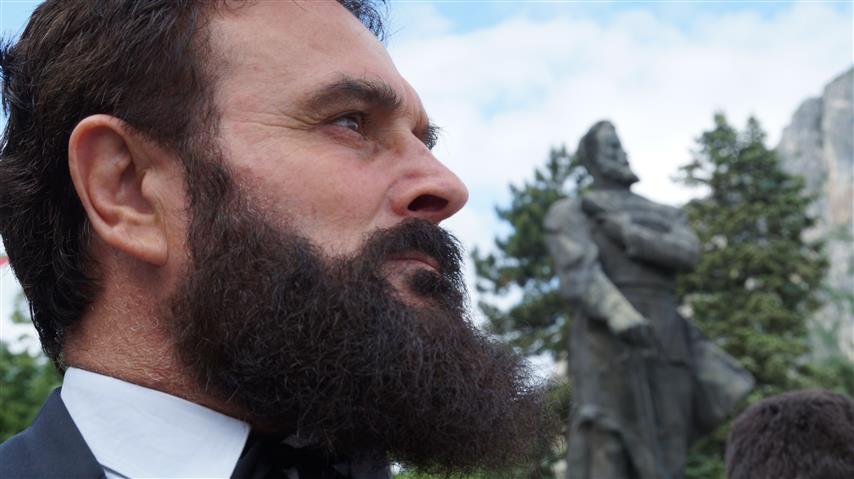“2 June is a sad day for Bulgaria because on this day, 140 years ago we lost one of the greatest Bulgarians ever born in our lands. Yet in the sadness there is joy, born of his heroism, of his courage, of his fortitude and his love of his country - a love, ready for the ultimate sacrifice - to lay down one's life. Botev's death was a wakeup call, urging us to rise and be rid of Turkish domination,” said in his speech Kamen Kamenov, mayor of Vratsa, the town where the memory of revolutionary poet Hristo Botev and of all people who laid down their lives for the freedom of Bulgaria is solemnly honoured.
Their memory was first honoured at the end of the 19th century. In times of peace and of war, in times of stability or in times of turmoil, whatever government may have been in power, the poet has invariably been honoured by the nation.
Hristo Botev lives on in the hearts of Bulgarians. They read and know his impassioned verses, take his ideas to heart, believing that they will help our nation get through all trials and tribulations. Philip Philipov is a teacher from Vratsa devoted to Hristo Botev, his ideas and his writing. People from the town say he resembles the poet, so when films are made about him, Philipov is frequently invited to play the part of his idol.

It is 140 years in 2016 since the outbreak of the April uprising, the “Following in the footsteps of Botev's detachment” trail that starts from the bank of the Danube near Kozloduy on 27 May and ends in the mountains near Vratsa on the 2nd June also marks an anniversary. Philip Philipov takes part in it every year, dressed in a uniform like the one the rebels once wore:
“Following in the footsteps of Botev's detachment” is imbued with a deep meaning. Last year 700 people took part, this year - 1,400. When I walk along, dressed up like Hristo Botev himself, the people around get really excited. The youngest participant in the hike this year is 3, the oldest, Aroun, is 82. He walks along next to me with his wife, as if he were a young man. Bulgarians nowadays are very withdrawn, they need to hear the voice of history to be able to open up, they need to be reminded of the historical figures of Levski and Botev without ideology or myths. That is how Bulgarians' hearts can be unlocked and filled with optimism.”
English version: Milena Daynova
During a visit by the Radio Bulgaria team to the Bulgarian Orthodox Parish "Nativity of the Mother of God" in Geneva, we had the pleasure of meeting Ventseslav Sabev, the son of long-time church history professor at the Sofia Theological Seminary,..
On November 15, 1910, Russian pilot Boris Maslenikov carried out the first airplane flight in Bulgaria. He took off in a Farman-type aircraft from an improvised airfield near Sofia. In the days that followed, several more demonstration flights were..
On 16 April 1879, the deputies of the Constituent Assembly debated, approved and signed Bulgaria’s first constitution, the Tarnovo Constitution. This document established the legal basis for the establishment of the new Bulgarian state following the..
During a visit by the Radio Bulgaria team to the Bulgarian Orthodox Parish "Nativity of the Mother of God" in Geneva, we had the pleasure of meeting..
On November 15, 1910, Russian pilot Boris Maslenikov carried out the first airplane flight in Bulgaria. He took off in a Farman-type aircraft from an..

+359 2 9336 661
